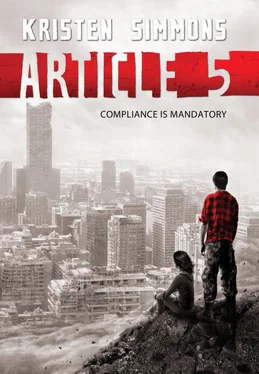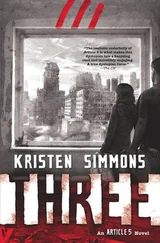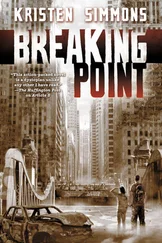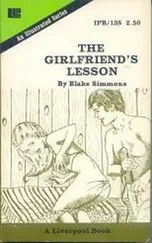“Chase!” I was on my feet at once, sprinting over the patches of damp grass and puddles toward the two men on the ground. It took me a full second to see that they were both struggling. Neither, at least so far, had been fatally injured.
As I rounded the dead cow it became clear to me that Chase was winning. He outweighed his opponent by fifty pounds and had youth and training to his advantage. The woman had attacked him too, though, and was flung to the side, sobbing miserably. Somehow, both guns were lying on the ground.
My eyes found Chase’s first, as it was closest. I scooped it up quickly, forgetting about safeties and chambers, and pointed it at the jumbled mass of blood-stained clothing that rolled frantically over the earth.
My hands trembled. I couldn’t shoot one without risk of hitting both.
“Stop!” I shouted.
Chase elbowed the thief savagely in the face. The man clawed at Chase’s wounded arm, and Chase hissed in pain.
Something changed inside me then. A bolt, straight down my spine. The blood ran hot and fast through my veins. My vision narrowed into compressed slits, and over it descended a red veil. Suddenly, I didn’t care how pitiful this stranger was or how hungry.
This had to stop. Now.
I raised the gun upward, toward the sky, and pulled the trigger. A loud pop slammed through my eardrums. The metal recoiled, sending a vicious kick through my wrist, down my forearm. I yelped, and the gun fell from my numb hand to the ground. My mind went absurdly but peacefully silent.
Chase lunged to a stand, shoulders heaving. All the calm negotiating had been stripped from his face to reveal the ferocity beneath. His eyes searched wildly for the source of the shot and came to rest on me.
The woman helped her husband to a stand. His mouth and nose were a mess of blood and dirt. They fled into the woods without another word.
I stared after them, feeling suddenly displaced, like a hammer with no nail. What do I do now? Everything had happened so fast and had ended just as abruptly.
When I turned around, Chase was coming toward me. His gait told me that he was furious before he ever opened his mouth.
I couldn’t think clearly. My ears were ringing from the shot, and my mind buzzed with the fleeting remnants of rage. Tears blurred my vision. The fear, momentarily paused, returned with full force, and in this frantic, baffled state I ran to him, and leapt into his arms.
He seemed surprised at first but soon was squeezing back.
“It’s all right,” he soothed. “No one’s hurt. You’re okay.”
His words sliced through me, and for the first time since he’d taken me from school, I knew the truth about us: I could not be okay if he was not okay. Pain, nightmares, fighting—all of it aside—he was a part of me.
“Don’t do that again! Not ever again!” I told him.
“I should say the same to you,” he said. I could feel his breath, warm on my neck.
“Promise me!” I demanded.
“I… I promise.”
“I can’t lose you.”
In that moment, I didn’t care about getting to South Carolina. I meant that I needed him . The way he had been. The way he still could be if he never let go. I don’t know what made me say it, but in that moment I had no regrets.
He hesitated, then pulled me even closer, so that I could barely breathe. My feet no longer touched the ground. I could feel his hands grasping my coat.
“I know.”
My heart rate slowed but pounded harder than ever before. He did know. He remembered now what it was like when we were together. I could feel it in the way he let himself go, in the shimmer that connected us when he stopped thinking. Here, returned at last, was my Chase.
Someone cleared his throat.
We detached like the wrong ends of two magnets, and what had felt so solid between us shattered like brittle glass. Having forgotten anyone else was present, we now faced the rancher. The baseball bat was tucked under his amputated arm, and his opposite hand rested on his son’s head. The boy was now smiling foolishly. My face heated, despite the falling temperature that came with the evening.
“Sorry to interrupt. My name’s Patrick Lofton. And this is my son, Ronnie.”
* * *
TWENTYminutes later we were following Patrick and Ronnie down to the main house. Much to the rancher’s chagrin, we had to leave the cow where it had fallen until morning, when he could bury it properly. They couldn’t butcher it; they didn’t have a cold room large enough to store the meat, and their buyer, a man named Billings, wasn’t due for another week. At the mention of the slaughterhouse, I shuddered; it made me think of the dead dog hanging in the woman’s trailer.
Patrick had insisted that we stop in so his wife could thank us properly with a meal. When we told him we had to move on, that we had family waiting in Lewisburg, he offered to drive us there, and we agreed: The unknown tenants of the ranch house had to be safer than the desperate, starving people in the woods.
Besides, we weren’t going to be a whole lot better off than the drifters if we didn’t eat soon.
Chase had introduced us as Jacob and Elizabeth, and Patrick seemed to accept the pseudonyms, despite the fact that we’d used each others’ real names earlier. I didn’t like them; I looked nothing like an Elizabeth. The only one I’d known was Beth from home, and she was five inches taller than me with bright red hair. But at least it wasn’t Alice.
Chase had then created a flawless story about our displacement to Richmond after the Chicago bombings, which encouraged Patrick to share that he too had borne witness to such atrocities. He’d been a soldier in the U.S. Army, stationed in San Francisco, when it had fallen. It was there that he had lost his arm.
We approached a rickety red barn with white trim and a green tractor outside its oversized doors. A pasture lined the land opposite it, where thirty or so black cows were just barely visible through the failing light.
“Mind dropping your firearm here, Jacob?” Patrick asked, pausing in front of the barn. “Just until we leave. We don’t bring guns in the house, what with Ronnie so young.”
I nearly said something about the child not being too young to be shot at, but held back, knowing the request had more to do with Patrick’s concerns about us than with his son’s youth. I felt Chase straighten, then nod in agreement. He still had his baton and knife, after all.
“Sure. No problem.”
Patrick forced open the creaking door of the barn. We were blasted by the musty scent from the hay bales that lined the splintering wooden walls. In an open space before us, a motorcycle with wide silver handlebars leaned on its kickstand. I felt a trickle of nostalgia looking at it.
“Whoa. They stopped making Sportsters before the War,” said Chase in awe.
Patrick laughed. “Not bad. You know bikes, huh?”
“I used to have a crossover. It didn’t have a customized transmission or—”
“Dad, come on. We’ve gotta get Mom!” Ronnie interrupted.
Patrick’s smile from the compliment faded, and he opened a cabinet in the back corner with a key from his pocket. On the top shelf was a hunting rifle. He added the thief’s handgun to it. Chase left his there as well, with only a moment of hesitation.
The Loftons’ house was warm and spacious. The living room, just past the laundry room, was littered with toy cars and action figures. A fireplace was embedded into the wall, and on its mantle were a dozen family pictures. All smiling faces.
Chase and I scraped off our boots as he removed the backpack. I looked at him, brows raised, and he returned the sentiment.
Читать дальше










